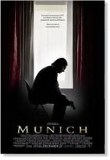 Critics
You never want to be labeled a fan of Israel in today’s Hollywood.
Mimi Weinberg: With Jews like Spielberg we don't need enemies.
Gila Almagor says thriller about Israeli assassinations of Munich 1972 massacre perpetrators will improve country's image.
Spielberg tells Time Magazine ahead of release of upcoming movie about Munich Olympic massacre.
Interviews
Audiences will be challenged by the complex moral issues that it raises.
"We're all kind of directly responsible for you know, most of the pain that goes on in this world."
Reviews
One thing critics agree on about Steven Spielberg's Munich: it will give audiences something more than popcorn to chew on.
A film of uncommon depth, intelligence, and sensitivity, Munich defies easy labeling.
As Steven Spielberg ponders the pointlessness of tit-for-tat retaliation between Israelis and Palestinians...
Steven Spielberg successfully enters Costa-Gavras territory with "Munich".
For aspiring Israeli actor Guri Weinberg, the big break in Hollywood was mixed with heartbreak.
|
 Variety Review: Spielberg is working in the political thriller epitomized by Costa-Gavras' Z
As Steven Spielberg ponders the pointlessness of tit-for-tat retaliation between Israelis and Palestinians, audiences will weigh "Munich" and find it wanting -- wanting involving characters and economical storytelling, for starters. The director's long-gestating meditative thriller on the aftermath of the massacre of Israeli athletes at the 1972 Munich Olympic Games takes its own sweet time making obvious points about the Jewish nation compromising its own values, and in the process forgets to be a pulse-quickening suspenser.
Beautifully made pic will spur newsy media coverage and possible consternation on both sides of the Israeli-Palestinian divide, but members of the general public will be glancing at their watches rather than having epiphanies about world peace. Younger audiences will be difficult to attract, and long-term commercial forecast looks iffy, unless heavy awards-season attention provides a boost.
It's rare for such a popular entertainer as Spielberg to fail to provide a rooting interest or, in its absence, a point of entry to one of his films. But the very premise of the film, that violence simply spawns more violence, runs contrary to viewer involvement, especially when the central character, the only one about whom any personal details are provided, is simply not very compelling.
From a filmmaking point of view, Spielberg is working in the political thriller vein epitomized by Costa-Gavras' "Z," and close to the domestic suspenser-with-substance mode of "The French Connection." Director's fleet visual style creates some potent, visceral set pieces and wonderfully evokes the early '70s Mediterranean and Euro settings. But the laborious, "Ten Little Indians"-style plotting overwhelms the technique, so what could have been a heart-pounding two-hour drama with serious overtones instead emerges as a lumpy and overlong morality play on a failed thriller template.
George Jonas' controversial tome "Vengeance" was adapted once before, in 1986, for the well-received HBO telefilm "Sword of Gideon," directed by Michael Anderson and written by Chris Bryant about a five-man commando unit unofficially sent out by the Israeli government to assassinate the 11 Palestinian terrorists identified as ringleaders in the murders of 11 Israeli Olympic team members.
For Americans of a certain age, the 1972 Olympics will always be remembered through the reporting of ABC anchor Jim McKay, with the assists from Peter Jennings and Howard Cosell, and it is with their able efforts that Spielberg begins this "inspired by real events" account of the Black September gunmen's break-in to the Israeli dormitories, where they killed some men and took others hostage. Snippets of how the final tragedy came to pass at an airport are dispersed throughout the remainder of the picture, most grotesquely when its explosive climax is intercut with a sexual act.
Saying "Forget peace for now, we have to show them we're strong," Israeli Prime Minister Golda Meir (Lynn Cohen) approves a secret plan to track down the perpetrators. Heading the team of assassins is Avner (Eric Bana), a former Massad agent and bodyguard to Meir, who's briefed on his assignment by an intimidating case officer (a forceful Geoffrey Rush); he'll have four colleagues, plenty of money and will operate entirely off the books.
Leaving behind his pregnant wife, Avner heads for Europe, where he convenes with fearless Steve (Daniel Craig), buttoned-down Carl (Ciaran Hinds), alleged bomb expert Robert (Mathieu Kassovitz) and document forger Hans (Hanns Zischler). They plot their first hit, against a seemingly affable middle-aged literary translator in Rome.
Working in a nimble, visually warm vein with regular lenser Janusz Kaminski, Spielberg brings a fresh, almost New Wave feel to his many street and cafe scenes in such diverse cities as Geneva, Paris, Beirut, Tel Aviv, Athens and London, all summoned up with rich efficiency on locations in Malta, Hungary and France. Spielberg even employs the zoom lens in a recognizably '70s manner, and the vaguely funky feel of standard-issue Euro hotel rooms is palpable.
The second hit, against a comfortably ensconced Parisian Palestinian, does not go so smoothly, and gives the director a chance to create a queasy Hitchcockian sequence involving an innocent little girl answering a bomb-implanted phone.
Even by this relatively early stage, deeply ambivalent feelings are generated about the unfolding drama, feelings that soon come to be shared by Avner. Oddly, however, Avner is not an especially empathy-inducing character. This is partly due to the script, and partly because Bana doesn't suggest much about Avner's inner life. To really succeed, "Munich" would need to have gotten in deep with Avner so that the viewer would be implicated in his growing conflict. The film provides a resolutely exterior experience.
Unintentionally illuminating the general deficiencies are superb scenes involving Avner's shadowy French contacts. Initially, Avner deals with the edgy Louis (Mathieu Amalric). Later, he meets Louis father (Michael Lonsdale), a shaggy old St. Bernard of a man who dispenses enigmatic aphorisms while preparing elaborate meals at his exquisite country estate.
Not as on-the-nose as most of the rest of the flabby script by playwright Tony Kushner and Eric Roth, these scenes are conspicuously well written and acted by Amalric and Lonsdale and exist on a level only approached again by a scene involving an exceedingly fetching girl (Marie-Josee Croze) in a hotel bar.
Interludes echo the theme of French duplicity in such matters that were central to Hitchcock's "Topaz," and also remind that very little goes down in the Middle East without the French being involved behind the scenes, a point "Syriana" is remiss to ignore.
Hanging over "Munich" is the enervating feeling that we're going to have to wait through 11 assassinations for things to wrap up. As it happens, it never gets to that point, as missions are botched, the most important Palestinian targets remain elusive, the wrong people get killed, and Avner's conscience gets the better of him. The wrestling match between the impulse for moral justice and the rational desire to break the cycle of violence is the crux of the film, but the issue is explored in a far too explicit and obvious manner. Pic simply does not sustain intellectual interest on a meaningful level.
Spielberg, Kushner and Roth go out of their way to try not to demonize Palestinians or anyone else, but the story is indisputably told with Jewish and Israeli concerns at heart. Filmmakers' fair-minded, liberal instincts have moved them to create a work that espouses rejecting an-eye-for-an-eye in order to give peace a chance. Unfortunately, in the Middle East, the olive branch has so frequently been met with guns that it's hard to feel that there's anything provocative or new or promising in the film's message. All the same, the range of Jewish and Arab opinion on the film should be interesting. Script provides none of the characters but Avner with any personal information, so the men played by Craig, Hinds, Kassovitz and Zischler are no more known by the end than they are at the beginning.
Technically, the picture is superb, with all hands delivering no-nonsense work at a high level. John Williams' subdued, flavorful score is perhaps as atypical as is his concurrent one for "Memoirs of a Geisha," the film Spielberg once intended to make himself.
- Todd McCarthy, Variety
|
|